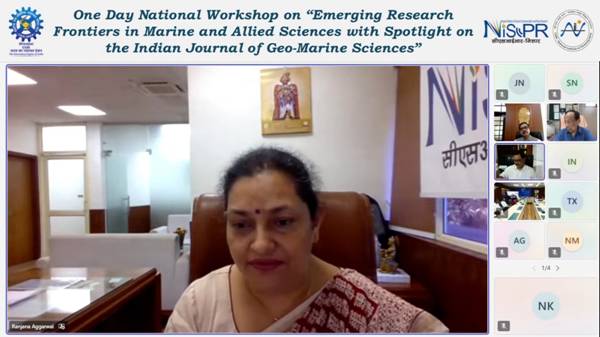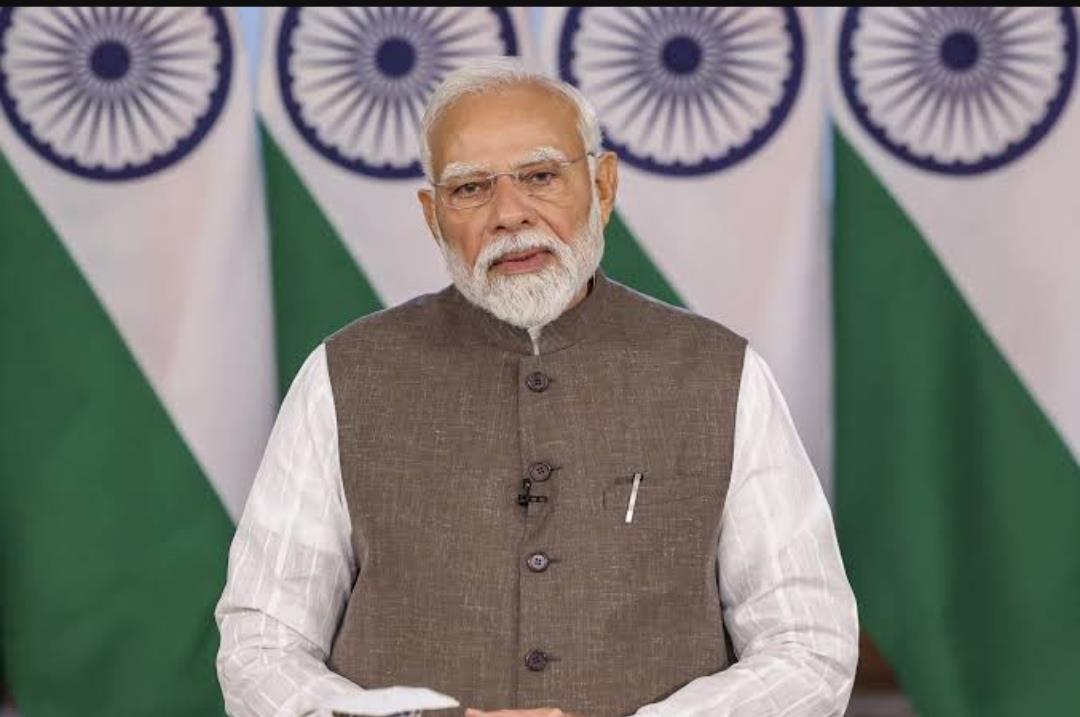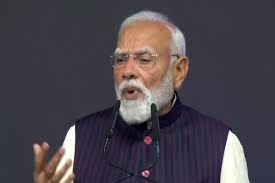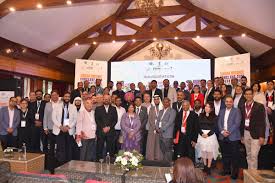Prof. Ranjana Aggarwal, Director, CSIR-NIScPR, delivering the welcome address at the virtual workshop on marine sciences
The CSIR-National Institute of Science Communication and Policy Research (CSIR-NIScPR), New Delhi, in collaboration with CSIR-National Institute of Oceanography (CSIR-NIO), Goa, successfully organized a one-day National Workshop on 27th May 2025 on “Emerging Research Frontiers in Marine and Allied Sciences with Spotlight on the Indian Journal of Geo-Marine Sciences (IJMS)”. The event brought together distinguished scientists, researchers, and policymakers to discuss current advancements in marine sciences, indigenous scholarly publishing, and sustainable research practices for an Atmanirbhar Bharat.
The workshop commenced with ceremonial lamp lighting, followed by a warm welcome from Dr. Puspanjali Tripathy, Principal Scientist, CSIR-NIScPR. Prof. Ranjana Aggarwal, Director, CSIR-NIScPR delivered the welcome address, emphasizing the importance of self-reliant scholarly publishing. Director, CSIR-NIScPR said, “Our scholarly research journals are free for both authors and readers, adopting a green and open-access model. This workshop focuses on the Indian Journal of Geo-Marine Sciences (IJMS), a leading dedicated journal in marine sciences in India, where we sensitize and encourage young scientists and academicians to publish”.
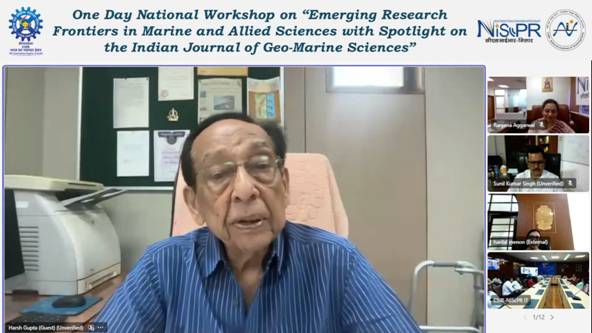
Chief Guest Dr. Harsh K. Gupta, Former Secretary, Ministry of Earth Sciences addressing the virtual workshop on marine sciences
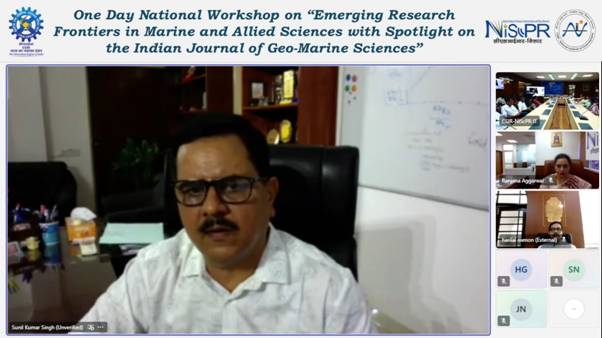
Prof. Sunil Kumar Singh, Director, CSIR-NIO addressing the virtual workshop on marine sciences
Prof. Sunil Kumar Singh, Director, CSIR-NIO, highlighted the critical role of marine research in addressing global challenges. Prof. Singh said, “If we are to further grow as an economy, the blue economy will have to play an important role, and the scientific fraternity needs to work on it. Our indigenous journals should be on par with international journals and earn global recognition; with such efforts, it’s possible in the future”.
The keynote address by Prof. Harilal B. Menon, Vice-Chancellor, Goa University, set the tone for the event. Prof. Menon remarked that India, with its vast coastline & diverse marine ecosystems, must continue research that addresses both foundational and applied aspects where academia can play a pivotal role.
Chief Guest Dr. Harsh K. Gupta, Former Secretary, Ministry of Earth Sciences (MoES) in his address said, “The Indian Journal of Geo-Marine Sciences can focus on publishing special issue on India’s remarkable achievements in marine sciences over the past 25 years and invite subject experts from all over India to write quality papers, which will give an impetus to the journal. If we pool our efforts together, we can achieve a quantum jump in the quality of publication”.
Dr. Charu Verma, Chief Scientist and Head, Research Journal’s Division, CSIR-NIScPR, proposed the vote of thanks for inaugural session.
A special talk by Dr. Nirmalya Majumdar, Senior Principal Scientist, CSIR-NIScPR, showcased institute’s contributions to fostering indigenous scholarly publishing. The technical sessions featured Dr. Dinesh Velip, Editor, IJMS, who introduced the journal (IJMS) and its role in advancing research in marine and allied sciences. Dr. Bhavya Khanna, Program Director (Communications), MoES, gave insights on effective scholarly writing and communication.
The highlight of the workshop was the panel discussion session titled “Leader’s Dialogue: Blue Horizons and Beyond – Research Orientation, Policy, Sustainability, and Scientific Leadership in Contemporary Research for an Atmanirbhar Bharat”. Panel was chaired by Dr. S. Satheesh Chandra Shenoi, MoES Chair Professor/Scientist. Session featured an eminent panel including Dr. Vineet Kumar Gahalaut, Director, WIHG, Dehradun; Dr. S. Ramesh, Scientist G, NIOT, Chennai; Dr. Rahul Mohan, Scientist G, NCPOR, Goa; Dr. Manguesh U. Gauns, Chief Scientist, CSIR-NIO, Goa; and Dr. Rekha J. Nair, Principal Scientist, ICAR-CMFRI, Kochi. Dialogue explored strategies and policy orientation to advance marine research and achieve sustainable development goals for an Atmanirbhar Bharat and also showcased current developments in marine research and future opportunities.
The invited talk by Prof. Devika P. Madalli, Director, INFLIBNET Centre, UGC-IUC, Gandhinagar, focused on “Open Science and ONOS – An Indian Perspective” highlighting the transformative potential of open science and equitable access to scholarly literature in promoting indigenous research.
The valedictory session featured presentation of a workshop summary by Dr. Dinesh Velip, followed by closing remarks from Prof. Sunil Kumar Singh, Director, CSIR-NIO. Dr. Charu Verma, Chief Scientist, and Head, Research journals Division, CSIR-NIScPR presented the final remarks and concluded the event with a vote of thanks.
The workshop underscored the importance of collaborative research, effective communication, and sustainable practices in marine and allied sciences, reinforcing CSIR-NIScPR and CSIR-NIO’s commitment to advancing scientific excellence and promoting indigenous scholarly publishing landscape.
*****

